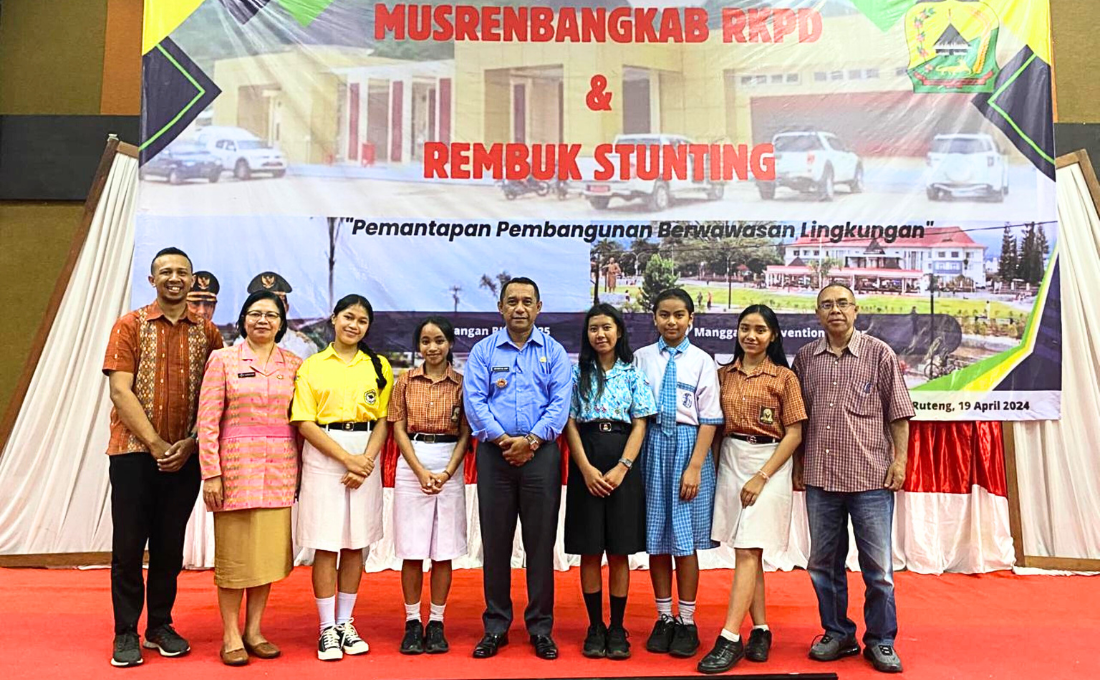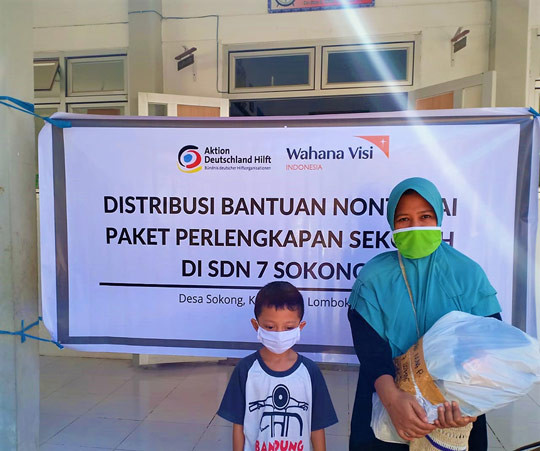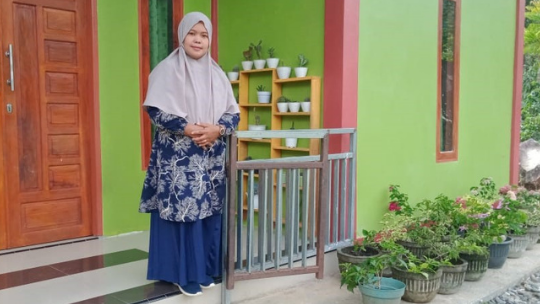Children's Voice: Solution of Nutrition Problems

Currently, there are still people in Indonesia who doubt a child's potential. 'What can a child do?' is a common expression. Because they still depend on their parents, children are often considered not yet entitled to participate. If they do express an aspiration, adults rarely listen. The status of being a child becomes a limitation, while the awareness of families and society regarding children's rights is slow to change.
This situation diminishes every child's hope to try and develop their potential. Being in an environment that assumes "children can't do anything yet" truly stunts the great potential every child possesses, denying them their rightful rights.
Yet, parents, caregivers, government officials, community and religious leaders, and other stakeholders know that children are the future generation. Surely, these future leaders deserve all their rights. If not, it's not just the child and their immediate environment that suffer, but the entire society, the entire country, even the entire world.
"Today I am a child, tomorrow I will be a leader. Make me a subject of development, not an object of development," says Anne, a girl from Manggarai Regency, East Nusa Tenggara. If Indonesia wants to achieve its dream of becoming a better nation, every child should be able to express such a loud statement as Anne did.
Bridging Hope for the Potential of Every Child
Wahana Visi Indonesia strives to open as many spaces as possible for every child to participate and develop their potential. WVI has a grand vision that from homes to the central government, everyone will start seeing a child as an agent of change. Parents, educators, health workers, and other stakeholders will begin to regard children as important individuals, with the right to participate and have a voice in the nation's development. Therefore, the existence of the Children's Forum is very meaningful for WVI. The Children's Forum can gather and amplify the voices of the most vulnerable children.
Anne is one of many children involved in the Children's Forum. Currently, Anne is 17 years old. Her aspirations have reached the national government level, but she admits it all started at home. For Anne, she was raised by great parents who gave her space to express herself without losing control. "A child will grow extraordinarily under the guidance of great parents. Growing up in a simple family doesn't mean facing a huge wall to success. I'm proud of my father; he always taught me to dare to take risks rather than being trapped in uncertain dreams," Anne recounts.
Anne's father, a tailor in a village in Manggarai Regency, has a parenting style that teaches Anne to dream big. From her mother, Anne learned about faith. "From my mother, I learned that with a strong foundation of intention and belief, God is always there to open the way," she says. While from the Children's Forum, Anne learned to be a critical person, to have aspirations and advocate, and to be a child who brings change to other children.
Thanks to the Children's Forum, Anne was also able to visit Jakarta, representing the aspirations of children from Manggarai during the launch of the ENOUGH campaign by Wahana Visi Indonesia. On February 27, 2025, Anne will also participate in the Side Event: 12th Asia-Pacific Forum for Sustainable Development, "Reaching the Unreached: Inclusive Solutions for Child Health & Nutrition in Asia-Pacific." This event is facilitated by World Vision. Anne will be the representative of Indonesian children who will present the results of Child-Led Research (CLR) on child nutrition and health issues.
Advocacy That Leads to Action
Anne has been active as a member of FAKAM (Manggarai Regency Children's Forum) since 2021. Two years later, she was elected as Vice Chair of FAKAM. Various FAKAM activities, both capacity building and routine meetings, are assisted by Wahana Visi Indonesia and the Manggarai Regency Women's Empowerment and Child Protection Agency (P3A).
One important activity in the Children's Forum is the preparation of an annual work plan. Anne and her friends develop work programs based on children's rights. Before drafting, she observes the situation of children in Manggarai. What child issues are important and urgent to address? From these observations, FAKAM developed a two-year work program, which was then presented to the local government.
Not just remaining silent, the Manggarai Regency Government chose to respond to FAKAM's work program seriously. The Regent invited FAKAM to present their work program before the leaders of the local agencies or organisations. "At that time, FAKAM's work program was immediately submitted to the Regent for follow-up," Anne added.
The full support from the local government gave Anne and FAKAM members greater confidence. Children were able to voice their opinions, and these voices were valued by stakeholders. One by one, FAKAM's programs were realised, such as socialisations on Child Identity Cards, wise use of social media, traffic discipline, stunting and reproductive health, and the establishment of Children's Forums at the sub-district and village levels. All these programs collaborated with relevant agencies such as citizenship agency, communications and informations, women’s empowerment and child protection, transportation, and health agency.
Anne and other FAKAM members were also involved in the preparation of national-scale CLR. This research targeted two important aspects of children's lives: protection and health, and how the correlation between the two impacts stunting rates in Indonesia. The research results received positive responses from the local government. The Women's Empowerment and Child Protection Agency invited Anne and FAKAM members to discuss and analyse the CLR results, then brought them to the Regent. The Regent promptly issued a Recommendation Letter regarding the children's research results, which must be followed up by relevant agencies. The Regent also issued letters to agencies to ensure budget allocation for child protection in villages, child health in schools, child nutrition fulfilment, and child reproductive health. "Kindness will always find its way," said Anne.
Anne Cares About Child Nutrition in Indonesia
"Regarding this nutrition issue, my friends and I have strong data through CLR. So, our task now is to voice the research results to the wider community and the government. The government can create, amend, and review regulations on child nutrition fulfilment and stunting management. The community can also have the right understanding and knowledge about child nutrition fulfilment. So that the nutrition issue doesn't worsen, and in the future, Indonesia has a good quality generation," Anne said clearly and firmly.
Anne chose to care and fight for the health of children around her through advocacy. She is concerned about the weighing data in Manggarai Regency, which still records 2,791 toddlers experiencing stunting (Source: Data from Dinas BP2KB Kab. Manggarai, August 2024). Therefore, as a child, she and FAKAM are striving for various programs to change their environment, starting from the children themselves, parents, caregivers, and stakeholders.
"As children and teenagers, we have a big role for the future generation. We can prevent stunting by being prepared to be parents. Physically prepared, meaning the reproductive organs have fully developed. Also, mentally prepared. From adolescence, we must prepare ourselves to be healthy mothers to give birth to healthy children. From adolescence, routinely consume Iron Supplement Tablets, understand child nutrition and the long-term impact of undernutrition, so that during pregnancy, we can pay attention to sufficient nutritious food intake to ensure the baby is born healthy and free from stunting," Anne advised.
The advocacy of Anne and FAKAM resulted in a regional regulation on preventing child marriage and reducing stunting cases. The Regent of Manggarai Regency targeted these two interconnected issues to break the chain of stunting or malnutrition problems. However, this work is not just a burden for Anne, the Children's Forum, or the government. "If all government sectors and the community can establish good cooperation, it is very possible to overcome child nutrition and stunting problems," Anne concluded.
Anne proves how a child can be a motivator and contributor to change for their region. Children's voices need ears that are willing to listen and hearts that are willing to change. Children prove that they are able to be citizens who contribute to the well-being of the whole community members. Various child issues are proven to find solutions when children speak up, including the issue of fulfilling the nutrition of the most vulnerable children.
Author: Hilaria Kurniati Meot (Program Coordinator for Manggarai Area Programme), Mariana Kurniawati (Communication Executive)



